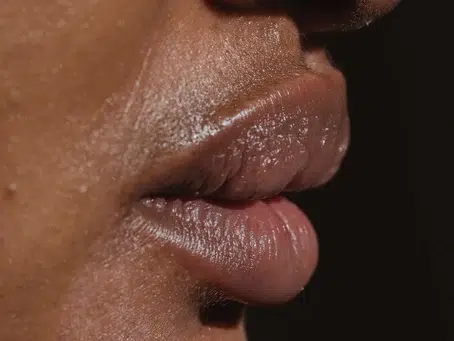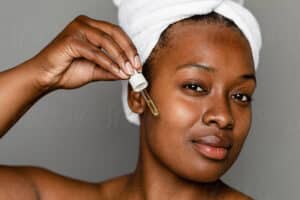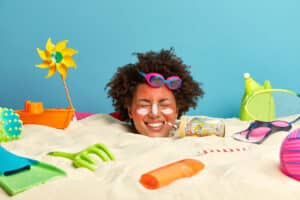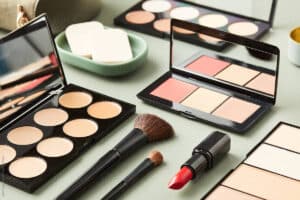Blackheads are the most frustrating forms of acne that are rooted deep in the pores and can be difficult to remove in a safe and effective way. They start as sebum plugs, which are collections of oily liquid that help the skin stay lubricated. When they mix with bacteria and dead skin cells, they congest the pores, When this material becomes oxidized by exposure to air it appears black hence the name ‘blackhead’. They can appear without other signs of acne being present.
Blackheads appear most frequently on the face (T-Zone), back, neck, chest, arms, and shoulders. There are more hair follicles in these areas.
Some factors can increase the chance of developing blackheads include;
Age and hormonal changes related to menstruation, pregnancy, and the use of birth control pills can also bring on blackheads in women.
Overproduction of skin cells by the body brings about blackheads.
Androgen; both boys and girls experience higher levels of androgens during adolescence that triggers greater secretion of sebum and a higher turnover of skin cells around puberty.
Other factors include; some health conditions, such as stress, polycystic ovarian syndrome (PCOS) and premenstrual syndrome (PMS), hair shaving, blocking or covering pores by cosmetics, medications that bring about rapid skin turnover and use of steroid based drugs.
Want to get rid of blackheads??? Do this;
Cleanse with salicylic acid; Salicylic acid is a popular over-the-counter ingredient in many skin cleansers. It breaks down dead skin cells and extra oil before they can clog your pores.
Skin brush; a skin brush can help get rid of the built-up debris that contributes to acne. It can also slow the signs of aging. Skin brushes can only be used occasionally with a gentle cleansing wash and avoid the use of a brush altogether if you have sensitive skin. You should always rehydrate your skin after using a skin brush.
Topical retinoid; Retinoid creams and lotions, which are made from vitamin A, can unclog your pores. They also help your body make new skin cells. Because retinoid makes your skin more sensitive to UV rays, you should use these creams and lotions before bed and out of the sun.
Chemical peels; a chemical peel is traditionally used for anti-aging benefits, such as reduced age spots and fine lines. The peels often contain AHAs or BHAs, and they work by exfoliating the skin. The procedure can unclog pores and start up new skin growth. Common ingredients in chemical peel products are salicylic, glycolic, and retinoic acids. Though not considered a primary treatment for blackheads, chemical peels can possibly remove dead skin cells and shrink enlarged pores.
Prescription treatments: Prescription medications that contain vitamin A, such as tretinoin, tazarotene, and adapalene, may be prescribed to keep plugs from forming in the hair follicles and promote the more rapid turnover of skin cells. Topical medications that contains benzoyl peroxide and antibiotics maybe helpful if you have pimples or acne cysts in addition to your blackheads.
Use of masks: Clay masks help to draw oils and toxins out of the skin, which helps to unclog pore. Charcoal masks work deep in the skin to draw out oil and other impurities,
Rest and relaxation: Getting enough rest and avoiding stress can also help, as stress can trigger sebum production. Don’t forget to exercise!
Food: a healthy, balanced diet with plenty of fresh fruit and vegetables is beneficial for overall health. It may reduce the risk of skin lesions becoming infected.
Don’t do this;

Removers: Removal strips, masks, and vacuums should be used with caution, as these can irritate and damage the skin if misused. Although pore strips may help remove junk from your pores, they can also remove elements like natural oils and hair follicles that actually help your skin not to dry and become irritated.
Don’t sleep with makeup and cosmetics: sleeping with your makeup results to more blackheads. If left on overnight, even noncomedogenic makeup can clog your pores. Makeup removers can also be used before washing your face for extra cleansing power.
Squeezing: Avoid squeezing blackheads, even with a metal blackhead remover, as this can irritate the skin and make the problem worse.
Scrubbing: This can worsen the problem. Scrubbing removes sebum. The sebaceous glands then work harder to replace the sebum, leading to more blockages and the risk of inflammatory acne.
While it might be almost impossible to resist attempting to extract that blackhead with your own two fingers, try your hardest to leave it alone.The best treatment is prevention. Enlist the help of a few effective ingredients for example retinoids, double-taskers that will not only help treat the skin condition but also prevent new blackheads from forming. Or, make an appointment with your dermatologist for a professional treatment.






